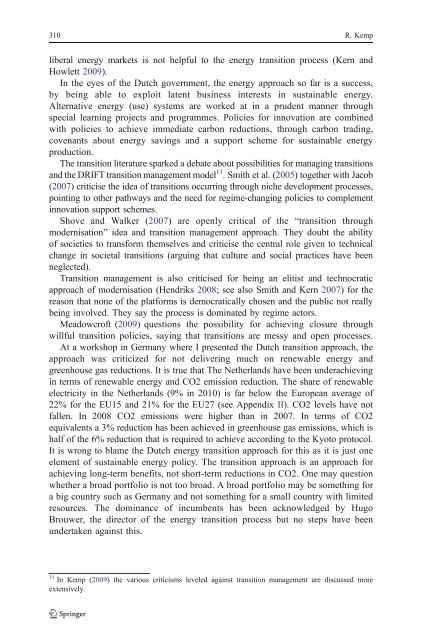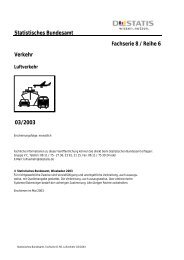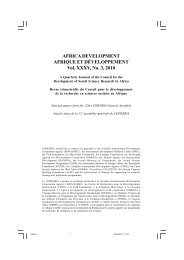The international economics of resources and resource ... - Index of
The international economics of resources and resource ... - Index of
The international economics of resources and resource ... - Index of
Create successful ePaper yourself
Turn your PDF publications into a flip-book with our unique Google optimized e-Paper software.
310 R. Kemp<br />
liberal energy markets is not helpful to the energy transition process (Kern <strong>and</strong><br />
Howlett 2009).<br />
In the eyes <strong>of</strong> the Dutch government, the energyapproachs<strong>of</strong>arisasuccess,<br />
by being able to exploit latent business interests in sustainable energy.<br />
Alternative energy (use) systems are worked at in a prudent manner through<br />
special learning projects <strong>and</strong> programmes. Policies for innovation are combined<br />
with policies to achieve immediate carbon reductions, through carbon trading,<br />
covenants about energy savings <strong>and</strong> a support scheme for sustainable energy<br />
production.<br />
<strong>The</strong> transition literature sparked a debate about possibilities for managing transitions<br />
<strong>and</strong> the DRIFT transition management model 11 . Smith et al. (2005) together with Jacob<br />
(2007) criticise the idea <strong>of</strong> transitions occurring through niche development processes,<br />
pointing to other pathways <strong>and</strong> the need for regime-changing policies to complement<br />
innovation support schemes.<br />
Shove <strong>and</strong> Walker (2007) are openly critical <strong>of</strong> the “transition through<br />
modernisation” idea <strong>and</strong> transition management approach. <strong>The</strong>y doubt the ability<br />
<strong>of</strong> societies to transform themselves <strong>and</strong> criticise the central role given to technical<br />
change in societal transitions (arguing that culture <strong>and</strong> social practices have been<br />
neglected).<br />
Transition management is also criticised for being an elitist <strong>and</strong> technocratic<br />
approach <strong>of</strong> modernisation (Hendriks 2008; see also Smith <strong>and</strong> Kern 2007) for the<br />
reason that none <strong>of</strong> the platforms is democratically chosen <strong>and</strong> the public not really<br />
being involved. <strong>The</strong>y say the process is dominated by regime actors.<br />
Meadowcr<strong>of</strong>t (2009) questions the possibility for achieving closure through<br />
willful transition policies, saying that transitions are messy <strong>and</strong> open processes.<br />
At a workshop in Germany where I presented the Dutch transition approach, the<br />
approach was criticized for not delivering much on renewable energy <strong>and</strong><br />
greenhouse gas reductions. It is true that <strong>The</strong> Netherl<strong>and</strong>s have been underachieving<br />
in terms <strong>of</strong> renewable energy <strong>and</strong> CO2 emission reduction. <strong>The</strong> share <strong>of</strong> renewable<br />
electricity in the Netherl<strong>and</strong>s (9% in 2010) is far below the European average <strong>of</strong><br />
22% for the EU15 <strong>and</strong> 21% for the EU27 (see Appendix II). CO2 levels have not<br />
fallen. In 2008 CO2 emissions were higher than in 2007. In terms <strong>of</strong> CO2<br />
equivalents a 3% reduction has been achieved in greenhouse gas emissions, which is<br />
half <strong>of</strong> the 6% reduction that is required to achieve according to the Kyoto protocol.<br />
It is wrong to blame the Dutch energy transition approach for this as it is just one<br />
element <strong>of</strong> sustainable energy policy. <strong>The</strong> transition approach is an approach for<br />
achieving long-term benefits, not short-term reductions in CO2. One may question<br />
whether a broad portfolio is not too broad. A broad portfolio may be something for<br />
a big country such as Germany <strong>and</strong> not something for a small country with limited<br />
<strong><strong>resource</strong>s</strong>. <strong>The</strong> dominance <strong>of</strong> incumbents has been acknowledged by Hugo<br />
Brouwer, the director <strong>of</strong> the energy transition process but no steps have been<br />
undertaken against this.<br />
11<br />
In Kemp (2009) the various criticisms leveled against transition management are discussed more<br />
extensively.








